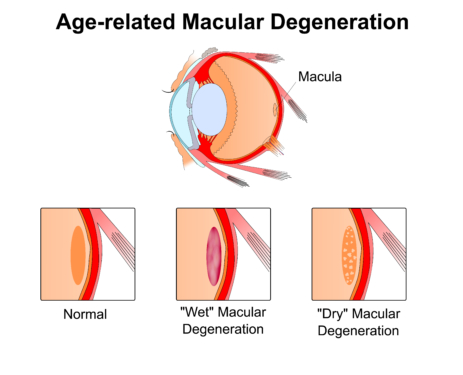Macular degeneration is a disease that affects the vision of nearly two million Americans. It is the leading cause of blindness and loss of vision in aging adults. Also known as age-related macular degeneration or ARMD, there two variations of the disease, dry (atrophic) and wet (neovascular or exudative).
With dry macular degeneration, light sensitive cells of the macula slowly break down – it is the most common type of macular degeneration, accounting for 90 percent of diagnosed cases. On the other hand, wet macular degeneration, a more serious and potentially damaging form of the disease, is less common and accounts for approximately 10 percent of cases, but results in 90 percent of legal blindness
To date, there is no known cure for either variation of macular degeneration. However, there are things you can do that may help prevent macular degeneration.
A recent study ran by researchers at the Westmead Institute in Australia, has shown that eating vegetable nitrates, found mainly in green leafy vegetables and beets, could help reduce the risk of developing early-stage age-related macular degeneration (AMD).
This study involved more than 2,000 adults over the age of 49 and followed them over a 15-year period.
According to the Westmead study, research showed that people who ate between 100 to 142 mgs of vegetable nitrates each day had a 35% lower risk of developing early AMD than people who ate less than 69 mgs of vegetable nitrates each day. You may read more about the study here.
Other things you can do that may help prevent macular degeneration include:
- Avoid smoking, and if you do smoke, stop.
- Take a multivitamin/mineral supplement
- The ARED’s formula may help lower your risk of advanced AMD
- The ARED’s formula may be found at the Fort Lauderdale Eye Institute, schedule an appointment to see one of our American Board Certified Ophthalmologists if you’d like to learn more.
- Maintaining a healthy weight along with regular exercise
- Controlling your blood pressure and cholesterol levels
- Have regular eye examinations for early detection
- Limit your intake of refined carbohydrates
- Wearing sunglasses to block UV and blue light that may cause eye damage
- Spinach is another great source of nitrates
The most important thing you can do if you suspect or are experiencing any type of vision loss, is to be seen by an ophthalmologist and to make sure you have your eyes examined at least once a year.







